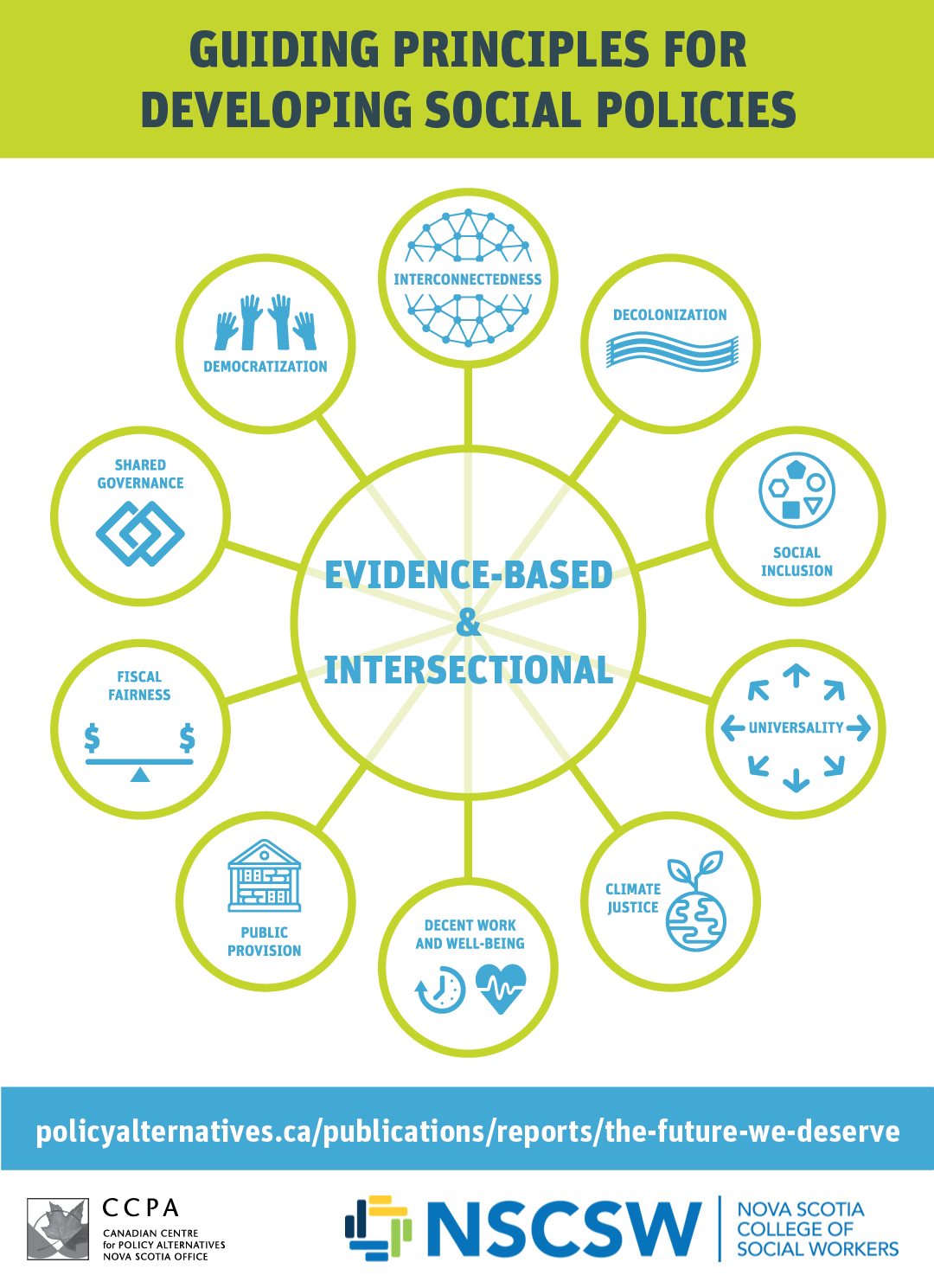A framework for change
In partnership with the NSCSW, the Canadian Centre for Policy Alternatives-Nova Scotia (CCPA-NS) released a new report in March 2020 entitled Creating the future we all deserve: A Social Policy Framework for Nova Scotia. The report lays out what is required for a transformative social policy agenda in our province.
Social workers know that significant change needs to happen in order to address or remedy the injustices and harms we see daily. The Social Policy Framework is designed to be at the root of this change. It creates a road map for arriving at a fair and just Nova Scotia.
The metrics commonly used to evaluate economic success have not considered whether all Nova Scotians are able to receive the care and services they need to thrive. A fundamental paradigm shift in our political goals is necessary: increasing well-being must be counted just as important as developing a strong economy.
Our profession is founded on humanitarian and egalitarian ideals. We envision and work towards a society that promotes social, economic and political equity. As social workers, we labour in solidarity with our clients, organizations and communities, and with Nova Scotians who are vulnerable, oppressed and dealing with the hurtful outcomes of society. This is why the NSCSW is so proud to partner with CCPA-NS to create this important tool.
We hope that this framework provides you with inspiration and hope that a more fair, just and progressive Nova Scotia is possible. It is our hope that the framework will be used by all Nova Scotians to transform our society into one that belongs to all of us: one that is grounded in shared responsibility for creating a strong, connected, and supportive society.
Guiding principles for social policy
The development and evaluation of public policy must be based on intersectional and evidence-based lenses. From that understanding, these ten principles arise:
- Interconnectedness
- Decolonization
- Social Inclusion
- Universality
- Climate Justice
- Decent Work and Well-Being
- Public Provision
- Fiscal Fairness
- Shared Governance
- Democratization
More about each of these principles can be found in the report. Download Creating the future we all deserve to explore how they can be applied to the issues that affect the well-being of all Nova Scotians. We also offer a workbook that you can use to start applying these principles to the issues you care about.
How to use the Social Policy Framework
The framework is intended as an advocacy and accountability document. It can be used in conversations with our neighbours, friends, co-workers, and elected officials about the kind of society we want and the social policies we need to support it. It can also be used as a tool for assessing government policy (both its action and its inaction).
This framework provides a guide for exploring questions like:
- To what extent are current government policies living up to our principles?
- What are the gaps?
- What should be done to address them?
- What makes for a good life for Nova Scotians?
- How shall we improve our collective well-being?
The Creating the future we all deserve report uses child care as an example, to demonstrate how each of the ten guiding principles can be applied to that issue. We’ve also used the framework with a group of social workers, who applied these principles to their experiences with child welfare services, and have additional workshops planned. Perhaps you can organize such a conversation in your own community? Download the workbook to get started.
Next steps
Once you’ve used the framework to evaluate or develop social policy, start identifying the people, government officials or organizations who need to take action to bring about the necessary change. Perhaps you need to develop public awareness and shift the Overton window on one or more issues. Or you may need to advocate for specific public policy or resource allocation decisions.
In 2023, NSCSW partnered with the Legal Information Society of Nova Scotia to develop an advocacy resource: We Have Power: a Guide to Engaging with Your MLA and Using Your Voice for Change. This plain language guide offers Nova Scotians information on how to get involved in democratic processes. We can create a more just and equitable future for our province by working together.
Keep us posted
Please let us know how you use the social policy framework! We want to hear how you’re using it to envision – and advocate for – transformative change.

Land acknowledgement
The Nova Scotia College of Social Workers is located in Mi’kma’ki, the ancestral and unceded territory of the Mi’kmaq. We are grateful to be able to live and work on this land. We are all Treaty people.
Sign up for Connection
CONNECTION is the official newsletter of the Nova Scotia College of Social Workers.





